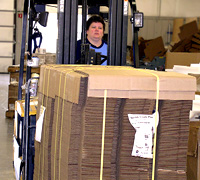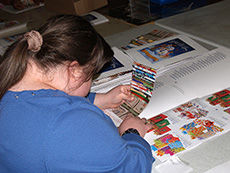What is the school counselor’s responsibility in the transition planning process?
Page 7: Post-Secondary Preparation: Employment
 Measurable post-secondary employment goals are required by IDEA ’04. Transition plans are developed in order to explicitly define the steps necessary to help the young person achieve these goals. Young adults benefit significantly from learning about the world of work, ideally through an incremental exposure to a growing range of occupations. Such exposure to community-based experiences and a variety of career areas will help the student to learn what he or she likes and doesn’t like. It also helps the student to identify his or her abilities and what additional skills he or she may need to acquire. The greater the exposure to real life career experiences, the greater the likelihood that students will be able to match their interests, preferences, abilities, and skills to occupations that they may want to pursue following school completion.
Measurable post-secondary employment goals are required by IDEA ’04. Transition plans are developed in order to explicitly define the steps necessary to help the young person achieve these goals. Young adults benefit significantly from learning about the world of work, ideally through an incremental exposure to a growing range of occupations. Such exposure to community-based experiences and a variety of career areas will help the student to learn what he or she likes and doesn’t like. It also helps the student to identify his or her abilities and what additional skills he or she may need to acquire. The greater the exposure to real life career experiences, the greater the likelihood that students will be able to match their interests, preferences, abilities, and skills to occupations that they may want to pursue following school completion.
An ideal (but not exhaustive) continuum of work-based learning experiences can start as early as middle school and might include:
- Work-site tours
- Job-shadowing assignments
- Service learning with a career component
- Unpaid internship or mentorship (high school and post-high school)
- Paid internship or work study (high school and post-high school)
School counselors can play a lead role in setting up partnerships with employers for the purposes of work-based learning and job placements. Others who may assume or assist in this role include vocational educators, transition specialists, and work-study teachers. Such training activities should be tied to the curriculum (e.g., the student’s course of study) and should be sustainable through post-secondary services, when necessary. The goal for students in this process is to develop the necessary skills for part-time or full-time employment.
Accommodations in the Workplace
 Just as individualized accommodations can make all the difference in the classroom, youth and young adults with disabilities may also need specific accommodations in the workplace. Often the same type of accommodation used in a school can carry over into the worksite. For example, employers or supervisors can provide a written set of directions for employees who have trouble remembering all the steps of a task. Also, assistive technology devices such as voice recognition or voice output software can be used to help individuals do their jobs.
Just as individualized accommodations can make all the difference in the classroom, youth and young adults with disabilities may also need specific accommodations in the workplace. Often the same type of accommodation used in a school can carry over into the worksite. For example, employers or supervisors can provide a written set of directions for employees who have trouble remembering all the steps of a task. Also, assistive technology devices such as voice recognition or voice output software can be used to help individuals do their jobs.
voice recognition
glossary
Employers may need help in thinking through the possibilities for accommodations, either from the student employee, job coach, or other professionals tied to this process. For instance, when Sandra interviews for a work-study position during high school, or a full-time job after graduation, she should have the skills and disposition to describe and request the accommodations that will help her succeed. If she does not have the ability to request such accommodations, the job coach or other support staff can convey those needs to the employer. The goal is always to help the worker to become as independent as possible in performing his or her job.
Work-Related Agencies
In addition to their school-based or college-based experiences, young adults can get assistance with job searches, applications, interviews, and job placements from a variety of agencies. These agencies support the transition from high school to the adult work world and typically provide one of two types of services: specialized and generic.
Specialized Services
 Agency representatives may be invited to a high-school junior’s or senior’s IEP meeting to start a critical linkage long before the student graduates. The following list identifies some of the most likely sources of specialized employment support for individuals with disabilities.
Agency representatives may be invited to a high-school junior’s or senior’s IEP meeting to start a critical linkage long before the student graduates. The following list identifies some of the most likely sources of specialized employment support for individuals with disabilities.
- State/ regional Vocational Rehabilitation (VR) departments
- Adult agencies that teach vocational or employability skills
- Specific collaborative projects aimed at particular groups of job seekers
- 18–21 year old school-sponsored transition programs in school systems
Connections with agencies may need to occur earlier than the junior or senior year, depending on the type and availability of services needed. The sooner these connections are made, the greater the likelihood that the services will be in place when the student exits high school. Therefore, it is extremely important to make these connections while the student is planning his or her transition and has a support system to assist with the process.
Generic Services
 A wide range of options exists for anyone in the general population who seeks assistance in obtaining employment skills or job placement. The IEP team can help the youth and family decide if these services are likely to help––if they are, the team should make sure the linkages are made long before the student exits the public school system. Some of these generic options include:
A wide range of options exists for anyone in the general population who seeks assistance in obtaining employment skills or job placement. The IEP team can help the youth and family decide if these services are likely to help––if they are, the team should make sure the linkages are made long before the student exits the public school system. Some of these generic options include:
- Trade/ technical schools with job placement services tied to their specific training programs
- Community and four-year colleges with job placement services
- Workforce Investment Act One-Stop Centers
- Departments of Labor websites and regional offices
- Job placement agencies (often private and in large metropolitan areas)
- Military services
- Apprenticeship programs
In addition, most states and communities have an array of agencies focused on employment services for individuals with disabilities. These agencies are skilled in preparing, placing, and supporting individuals with disabilities in employment settings.
For Your Information
Both the U.S. Department of Labor and the Departments of Labor at the state level provide information concerning employment. Materials available online and at other locations (e.g., public, high-school, college libraries) contain useful information regarding emerging employment trends in local, regional, and statewide areas.
Transition Update – Supporting Sandra's Vocational Decisions
 As a member of Sandra’s IEP team, Mr. Hunter helps her to identify post-secondary training options. Because her vocational choice at this point is a nursing assistant, Mr. Hunter identifies a private training academy that offers nursing assistant certification courses as a potential post-school training option. In addition, he connects Sandra with the Red Cross, through which she can take First Aid and CPR training courses. He also utilizes his community network to help her to obtain a volunteer position with the Green Springs Assisted Living Center. Sandra volunteers there one day a week after school, experience that gives her a good sense of what her future career choice might entail.
As a member of Sandra’s IEP team, Mr. Hunter helps her to identify post-secondary training options. Because her vocational choice at this point is a nursing assistant, Mr. Hunter identifies a private training academy that offers nursing assistant certification courses as a potential post-school training option. In addition, he connects Sandra with the Red Cross, through which she can take First Aid and CPR training courses. He also utilizes his community network to help her to obtain a volunteer position with the Green Springs Assisted Living Center. Sandra volunteers there one day a week after school, experience that gives her a good sense of what her future career choice might entail.